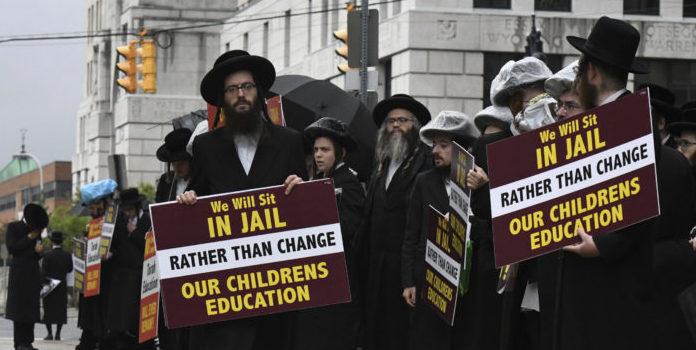(Headline USA) New York Gov. Kathy Hochul’s far-left administration is imposing new oversight of private and religious schools following allegations that the schools are promoting faith-based values which conflict with Democrats’ woke, anti-religious indoctrination efforts.
Critics claim thousands of children are graduating from Orthodox Jewish schools lacking basic academic skills, including the ability to read English—although the same is true of the deep-blue state’s public-school system in places like New York City.
Illiteracy in the Big Apple has skyrocketed since a push by former Mayor Bill de Blasio to lower standards and eliminate meritocracy under the pretense of promoting racial “equity.”
Nonetheless, a Board of Regents committee unanimously approved guidelines Monday to make sure instruction at the state’s private and religious schools is equivalent to that of its public schools.
The rules would apply to all of New York’s 1,800 nonpublic schools but would have the greatest impact on the Orthodox Jewish schools, called yeshivas, some of which provide rigorous religious instruction but little or no teaching in secular subjects like English, math, science and history.
Defenders of the schools say parents have the right to send their children to programs consistent with their beliefs and traditions.
As the Regents met Monday, protesters assembled outside, some with signs reading: “We will sit in jail rather than change our childrens [sic] education.”
Many yeshivas in New York state are modern Orthodox schools that provide a full secular curriculum along with religious studies. But there have been complaints that some yeshivas run by strictly observant Hasidic Jews were not meeting basic academic standards.
A New York Times investigation published Sunday cited instances of English teachers speaking only Yiddish to students, teachers using corporal punishment and graduates who said they were woefully unprepared for life or employment outside of their communities.
Virtually all of the Hasidic boys who took state standardized math and reading exams in 2019 failed, the report said.
A final vote was scheduled for Tuesday on new Board of Regents rules that would give private schools multiple pathways to show they meet a longstanding legal mandate to provide an education that is “substantially equivalent” to that of a public school.
Among the criteria is that primary subjects be taught in English.
“We are trying to obviously adhere to the law but also create some flexibility around that as well,” state Education Commissioner Betty Rosa said.
State education officials have spent years trying to strike a balance.
An initial set of guidelines released in 2018 was struck down by a state judge who said they were not implemented correctly. The department reviewed about 350,000 public comments following the release of the latest proposal and made adjustments in response, authorities said.
“The regulation respects that parents have a constitutional right to send their children to an independent school and that we respect the worldviews of the schools and their communities,” assistant commissioner Christina Coughlin said.
The group Parents for Educational and Religious Liberty in Schools, which represents yeshivas, said families choose to pay for private or religious schools because they believe in their educational approach.
“A government checklist, devised by lawyers and enforced by bureaucrats, hampers rather than advances education,” the group said in an email. “Parents in New York have been choosing a yeshiva education for more than 120 years, and they are proud of the successful results, and will continue to do the same, with or without the blessing or support of state leaders in Albany.”
Under the rules, a school can demonstrate equivalency, for example, by using state-approved assessments or operating a high school registered by the Board of Regents. It also can be reviewed by the local school district.
Groups representing Roman Catholic and Christian schools said they are confident their schools meet the substantially equivalent standards.
Naftuli Moster, who founded a group to improve secular standards at yeshivas, said he worried the schools would use the issue of cultural sensitivity to exploit loopholes without clearer guidance on how the regulations will be enforced, something the state is expected to address in the next few months.
“How you teach it or what you incorporate into the teaching is not what matters,” Moster said by phone. “It’s objective whether you teach science. There’s no Jewish science. It’s objective whether you do or do not teach social studies.”
Private schools that fall short of the threshold will be given time to adjust their instruction, state education officials said.
But those that may refuse to comply could lose state funding and their standing as a school with the state.
Parents who continue to send their children to such a school could find themselves in violation of the state’s compulsory education law requiring that children between the ages of six and 16 be provided with a program of instruction, either at a public school or elsewhere.
Daniel Morton Bentley, a lawyer for the state Education Department, said Friday that much of the public pushback has focused on “philosophical opposition to state regulation of nonpublic schools,” which he said is required by law and not changed by the Regents’ action.
Public school districts would be required to complete initial reviews of nonpublic schools within their boundaries by the end of the 2024-25 school year.
Adapted from reporting by the Associated Press

